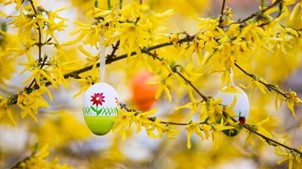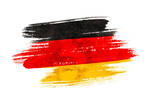 When is Easter celebrated in Germany? Easter is celebrated every year in March or April. Since the holiday always takes place on the Sunday after the first full moon of spring, Easter is on a different weekend every year. Easter is originally a church holiday. On Easter Sunday, Christians celebrate the resurrection of Jesus. Easter is also the end of Lent (the 40-day fasting period before Easter). In the past, eggs were not allowed to be eaten during Lent. Therefore, they were preserved and to distinguish them from the uncooked eggs, they were painted. There are many Easter traditions. On Easter, many people dye and paint or decorate their Easter eggs themselves. For this, chicken eggs are blown out or boiled and painted with different colors. There are many different techniques. Easter eggs symbolize fertility, life and new beginnings. Homes and gardens are also decorated during the Easter holiday. Many families make an Easter bouquet. Typically, the branches of forsythia are used for this or pussy willow. The branches are placed in a vase and hung with the painted and decorated Easter eggs. Throughout Europe, pastries and sweets are also a part of the Easter celebration. In Germany, many families have an Easter brunch. People often bake an Osterzopf (braided sweet yeast bread). Another tradition is the Easter egg hunt. The Easter eggs or nests are hidden by the Easter bunny all over the house or in the garden and must be found by the children. But where does the Easter bunny actually come from? The custom that different animals - and not just the Easter bunny - are responsible for hiding the eggs dates back to the 16th century. In Tyrol, the Easter hen laid the eggs for a long time, in Schleswig-Holstein, Westphalia, Lower Saxony and Bavaria came the fox or the Easter rooster, in Switzerland the cuckoo hid the eggs and in Thuringia the stork. From the 19th century onwards, the Easter bunny established itself as the undisputed symbolic animal for Easter. Easter is also a family day. People visit family and in many families an Easter walk is very important. Here are a few German-English terms around Easter: Ostern – Easter der Osterhase – Easter bunny das Osterei – Easter egg das Osternest – Easter nest der Ostersonntag – Easter Sunday der Ostermontag – Easter Monday die Palmkätzchen – pussy willow (plant) das Schokoladenei – Chocolate Easter Egg der Osterspaziergang – Easter walk der Osterzopf – braided sweet yeast bread If you want to bake an Osterzopf, you can try this recipe: Osterzopf Have fun baking and Happy Easter Comments are closed.
|

